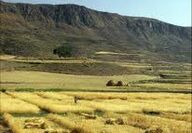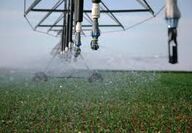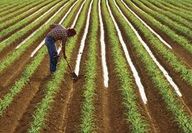Sorted by date Results 151 - 175 of 175

I really think we can improve the profitability of our farming operation by improving the soil health on our farm. Last week I talked about our first real experiment with improving soil health. We planted a forage mix of field peas, flax, sunflower, and radishes following last year’s winter wheat harvest on our irrigated field. A neighbor put his livestock on these acres and grazed this mix this March. We will plant corn into this forage residue. We were careful not to overgraze the forage m...

The “Brown Revolution” is a term given to the emphasis that is now being placed on improving the soil’s health on the farms and ranches across our country. Agriculture went through the “Green Revolution” years ago which helped shape modern day agriculture. During the “Green Revolution” commercial fertilizers were developed and crop varieties were developed through plant breeding to site-specific growing regions. Herbicides to control specific weeds were developed. These technologies...

It’s sure been an ugly April and that is exactly what we needed. The majority of us have experienced several days of snow, wintery mix, spring showers, and back to blowing snow. April has been above normal in precipitation and it couldn’t have come at a better time. With this moisture has come an optimism that the drought may be easing and we’ll have a chance at producing good crops and hay this growing season. All we need now is for Mother Nature not to forget about us and give us “norm...

Thankfully we finally received a blanket of wet snow across our growing region. There is also more snow in the forecast which should help us to recover from the prolonged drought we’ve experienced since last growing season. This welcome moisture will begin to add to our soil moisture profile for the upcoming growing season. The past couple of weeks I’ve shown that no-till crop production on our irrigated acres has many benefits. Economic analysis of no-till crop production has shown no-till to... Full story

Jessica Johnson, UNL agricultural educator at the Panhandle Research and Extension Center located in Scottsbluff has compiled budgets for the majority of the irrigated crops commonly grown here in our region. I’d like to take a look at these budgets that compare strip till, conventional tillage, and no-till crop production systems. Jessica’s budgets assume equal use of irrigation in producing these crops. When you compare these budgets you also need to factor in that the no-till crop pro...

No-till crop production has proven to be the best production system for conserving moisture. Leaving the previous crop’s residues on the soil surface and attached has improved water infiltration into the soil and reduced soil moisture evaporation. Numerous research projects have shown the moisture conservation that no-till crop production provides under irrigation. The University of Nebraska has conducted research at the North Platte research farm which has shown that leaving residues on the s...

Last week I looked at some of the budgets Jessica Johnson, Ag Educator with the UNL Panhandle Resource and Extension Center, put together for winter wheat production on dry land acres for the Panhandle. Jessica’s budgets were for conventional winter wheat/summer fallow, winter wheat/chemical fallow, and winter wheat grown in a continuous no till crop rotation. These budgets indicate a yield of 28.01 bushels/acre is required to cover all costs associated with winter wheat production grown in a co...

Jessica Johnson, University of Nebraska Extension Educator at the Panhandle Research and Extension Center, has been busy this winter working on crop budgets. Jessica has developed budgets for dry land as well as irrigated crops using different crop production systems. For the dry land crops she developed budgets for winter wheat using conventional tillage, no-till summer fallow, and no-till continuous cropping systems. She also developed budgets for dry land corn, field peas, sunflowers, and...

I’m sitting in a hotel room in Pierre, S.D., waiting for the brakes to get fixed on our recently purchased semi-tractor. We have a full load of field pea seed sitting on the trailer in tote bags. Our situation has got me to thinking about everything involved in the process of providing a consistent and healthy food supply to our consumers. With more and more field pea acres being planted in our region, we decided getting all the seed from South Dakota to our region was going to require some r...

Once we made the commitment to adopting a no-till crop production system we needed to learn residue management with our equipment. We also had to determine a cropping rotation for our farm that would give us the best chance for success. Needless to say we had a few bumps along the way. We adapted our combine to manage the residue at harvest by adding chaff spreaders to evenly distribute the chaff coming out of the back of the combine. Eventually we also adapted a stripper head to better manage...

There was a gradual progression on our farm to adopting a no-till cropping system. Our father passed on to us the value of conservation farming practices. He worked closely with University of Nebraska researchers and allowed them to do research on our farm studying stubble mulching practices and soil erosion on our farm. We continued down this path of trying to leave more residues in the field in our winter wheat/summer fallow rotation. Cheatgrass was always a problem, and at the time the best...

I’ve been asked to speak at the No till On the Plains winter conference in Salina, Kan., again this year as well as the High Plains No Till winter conference in Burlington, Colo. I’ve been asked to look back at over 20 years of no-till crop production and discuss the evolution of my no-till farming experience during this time. My sister Janet also gave me a memory stick for my computer for Christmas this year. Janet scanned all my parent’s photos and slides over the past 60 years on this memor...

There a couple large regional no-till meetings coming up that I’d like to talk to you about. I think it is very important for a producer who is considering adopting or has adopted no-till farming practices to attend. These meetings bring in speakers from around the region, country, and world to talk about the latest updates and trends in no-till crop production. These meetings are an incredible place to network with other no-till producers. You will also gain a larger perspective on the p...

The field pea meetings have all been scheduled and times and places have been finalized, so I wanted to pass this information on to growers around our region. These meetings will cover production of field peas and marketing of field peas. Field pea meetings this coming week are scheduled in Gering at the Farm and Ranch Museum on Wednesday, Jan. 16, beginning at 1 p.m. On Thursday, Jan. 17, there will be a field pea meeting in Albin. This meeting will be held at the Albin Community Center...

There are several educational meetings scheduled for January and February, 2013 that producers in our area should plan to attend. I’ve been going to no till crop production meetings for over 20 years and I have always felt that attending as many of these meetings as possible has always been time well spent. These educational meetings are a great way to meet and visit with other producers about their no-till crop production practices. These meetings always include speakers that cover a variety o...

As 2012 winds down I thought a little reflecting back would be a good thing to do. Sometimes it helps to look back on your successes that you were a part of over the past year and take a hard look at your failures to keep you humble and to continue the never ending learning process. Continuing education is important in every business and agriculture is no exception. I feel it is very important to be flexible in your decision making and embrace the changes that are inevitable. Mother Nature...

I’d like to start by wishing everyone a very Merry Christmas! I hope everyone is able to spend the holidays with friends and family spreading good cheer throughout our region. We have the results of our cover crop biomass sampling back and the cover crops performed about like we thought they would. I think we could justify the cost of planting the cover crops with the benefits we’ll see from producing them, but I do have some concerns with producing cover crops. Our sampling from the cover cro...

In the past couple of articles I’ve talked about how we have added diversity into our cropping rotations to diversify markets and improve soil health. We have added field peas into our dry land cropping rotation which has allowed us to diversify our herbicide rotations, improve and diversify our soil microbial populations, and add a legume in our crop rotation for nitrogen fixation. Our crop rotation is now winter wheat, followed by corn, then field peas and back to winter wheat. I also talked a...

My trip to Pierre, S.D., went well considering the wintery conditions I drove through on my way there. We had a couple of inches of snow here in Alliance and as I drove north through the Hay Springs and Rushville area they had significant snow on the ground, 6 to 8 inches. Fortunately the wind wasn’t blowing so the roads were in good shape. The band of snow lasted until just north of Martin, S.D. It was good to see some old friends at the Ag Horizons conference. I hadn’t attended this con...

I’m headed off to Pierre, S.D., for the annual Ag Horizons Conference this week to speak to the growers in the region about adding diversity into their cropping systems. I am looking forward to attending this meeting since it has been awhile since I’ve been there and I always look forward to these regional meetings. I’m certain I’ll leave the meeting feeling like it has been time well spent visiting with growers and speakers from this area. I’ve been asked to speak about adding diversity...

Last week I wrote about the wind storm that caused a lot of damage to the corn crop in our region. From what I understand the damage was pretty wide spread east and south of the Panhandle as well. I also spoke with a producer in central South Dakota who said their area suffered loss as well from the wind. We observed on our farm that our corn appeared to withstand the high winds better than some of the neighbor’s corn and I really don’t have a good reason why this would be. We had plenty of los...

Last week I wrote about the wind storm that caused a lot of damage to the corn crop in our region. From what I understand the damage was pretty wide spread east and south of the Panhandle as well. I also spoke with a producer in central South Dakota who said their area suffered loss as well from the wind. We observed on our farm that our corn appeared to withstand the high winds better than some of the neighbor’s corn and I really don’t have a good reason why this would be. We had plenty of los...

I was visiting with neighbors a few weeks ago about the bountiful harvest we were having in our area on our irrigated crops. The sugar beet and edible bean harvests were both above average in yield provided you had the irrigation water necessary to keep the crop in good shape. The early corn harvest yields were also showing an above average corn harvest could be expected. The following week “The Wind” came roaring through our region for a couple of days. The airport weather station reported 77 m...

I’d like to revisit last week’s article on the wind erosion on our farm. I’ve had plenty of time to think about my management decisions that caused the problem in the first place. I’ve had plenty of time to survey the situation and contemplate as I am stripping these fields with a chisel plow that we adapted to rough up the soil surface without damaging the wheat too extensively. We actually have a good stand of wheat despite my poor management thanks to a timely snow and rain which supplie...

Mark Watson Panhandle no-till educator I really learned a hard lesson from Mother Nature last week with the winds that blew through our area. I also feel like a damn fool and I’m definitely humbled. We had severe wind erosion on our farm where we planted our winter wheat behind our field peas. I never dreamed I would have such a devastating loss of soil with the amount of residue we had on the soil surface when we planted our winter wheat. Unfortunately because of my carelessness, the soil t...